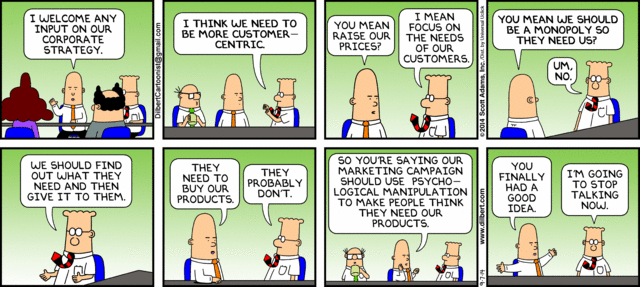Manipulation vs. Customer Focus, Dilbert-style
One of the post-speech questions I’m often asked is whether employing my neuromarketing strategies is “manipulative” and/or unethical. This weekend’s Dilbert strip by Scott Adams highlights the divide between manipulation and customer focus:
All too often some people in a business look to neuromarketing (in the broad sense) as a quick fix to boost sales in the short run. Much like the CEO character in the strip, it’s another tactic (like raising prices) that’s good for the company for a brief time but most likely bad for both the customer and the company’s long-term prospects.
It’s certainly true that pushing the right emotional buttons or using some technique out of Persuasion Psych 101 can improve the response to an ad or campaign. But, those gains will be short lived if the product doesn’t deliver what is expected or if it’s not right for the customer.
My response to the “manipulation” question is always, “If you are being honest, and if you are helping the customer get to a better place, it’s not manipulation and it’s not unethical.”
The master salesperson, Zig Ziglar, could offer a hundred tips and tricks to help move a deal forward or get the customer to sign a contract. But, he always emphasized that his most important persuasion tool was his own integrity. He would sell only if customer wouldn’t regret the purchase and would, in fact, appreciate the effort of the salesperson.
Ziglar’s approach to persuasion with integrity ensured not only happy customers but future referrals as well.
In today’s age of enforced transparency for business, manipulative tactics that deceive the customer simply won’t work. They will be quickly exposed and, with consumer voices amplified by social media, cause far more damage to the business than any short-term benefit.
So, learn from Dilbert… he’s a techie, not a marketer, but he understands what’s important: focus on your customers and their needs.

